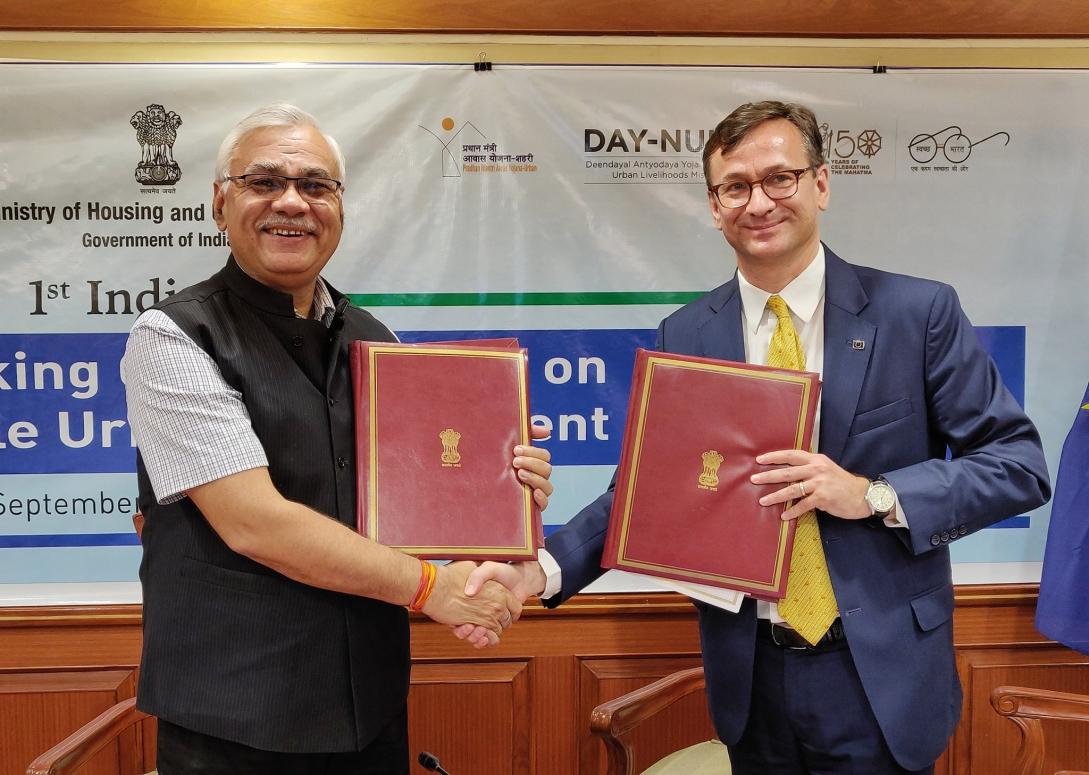EU India to intensify cooperation on smart and sustainable urbanization

New Delhi, 19 September 2019: The European Union (EU) and India today agreed on a Joint Action Plan 2019-2020 to step up their cooperation in the area of Smart and Sustainable Urbanization. This was announced as a conclusion to the 1st India-EU Urban Forum and 1st Joint working Group on Sustainable Urban Development, which was jointly organized by the EU and India in New Delhi from September 17-18. Five action points under the plan focus on: a) supporting Smart and Sustainable Cities b) promoting investments in sustainable urbanization c) promoting climate action and disaster risk reduction in cities d) Developing effective solid waste management & treatment and promotion of circular economy e) Developing effective water supply & sewage system f) Innovation in Housing.
The India-EU Urban forum was inaugurated by Shri Durga Shanker Mishra, Secretary, Ministry of Housing and Urban Affairs along with Mr. Rudolph Niessler, DG REGIO, European Commission and Mr. Raimund Magis, Chargé d'affaires, Delegation of the European Union to India. While the first day of discussions focused on policy, the second day took stock of the city-city cooperation and facilitated businesses cooperation between the two regions. An online EU-India project dashboard was also launched, with the objective to facilitate sharing of best practices on the implementation of urban projects supported by the EU and Member States in India.
At the India-EU Summit in October 2017, the two sides had agreed to a Joint Declaration on Partnership for Smart and Sustainable Urban Development. While the European Union and its Member States have responded to India’s urbanisation challenge with a number of initiatives during the last few years, the next phase of implementation will see strengthening and enhancing of cooperation in the area of urban planning, urban environment, sustainable urban mobility, green housing, waste management, waste water treatment, drinking water supply, resource efficiency and circular economy, clean energy, energy efficiency, ICT solutions and climate change adaptation in cities.
60% of the world's population is estimated to live in towns and cities in the next 10 years with 600 million people estimated to be living in Indian Cities by 2030. Rapid urbanization brings in its own set of challenges. The next phase of implementation will focus on tackling these challenges jointly. Some key action points agreed under the Action Plan are:
- The European Investment Bank (EIB), EU's bank, will strive towards launching additional investment projects in the field of Urban transport with a value of up to €1 Billion. EIB has already financed metro projects upto € 1.6 Billion in India
- EU will continue to support 12 smart cities in India, under the EU-AFD Smart City project, focussing on sustainable mobility, public open spaces, social and organisational Innovation and urban e-governance. EU currently provides € 21.5 million as investment, grants and technical assistance to 3 projects implemented by AFD, with a focus on sustainable urban mobility, green affordable housing and smart cities.
- Enhancing its support on city-to-city pairing and cooperation between 12 Indian and European cities on sustainable urban development, the EU will bring in additional resources till the end of 2020 under the IUC programme. In this phase, the EU will support the implementation of the city plans, which have been drafted together with the respective Indian cities. This programme will contribute to the achievement of India’s climate change commitments, and exchange/transfer know-how and capacities with EU cities in the fields of urban sustainable development, energy efficiency and climate action
- The EU will have a strong focus on facilitating involvement of European businesses in the Partnership on smart and sustainable urbanisation. In order to facilitate partnerships between the EU and Indian businesses, the EU will run pilot projects to support companies in identifying partners, access to financing, and adapting technologies and business models to the Indian context. Focus areas will include AI, Internet of Things, block chain, standards for enhanced data management; sensor technologies; smart lighting; groundwater use and drinking water, wastewater treatment and treated water reuse; plastic waste management, e-waste recycling, waste to energy green buildings, energy efficiency, sustainable construction and demolition, green cooling, smart grids; renewable energy grid integration district energy system, solar PV for rooftops, access to modern energy, distributed energy, waste to energy; mobility infrastructure, e-mobility, green Civil Aviation, alternative fuels (in particular biofuels).
7 Indian cities sign the Commitment for the Global Covenant of Mayors for Climate and Energy
Four Indian cities, namely Bhavnagar, Jamnagar, Junagadh, Kochi signed the Global Covenant of Mayors for Climate and Energy (GCOM) commitment in presence of Shri Durga Shanker Mishra, Secretary, Ministry of Housing and Urban Affairs and other senior EU officials. This takes the count to 15 Indian cities who have joined this initiative, representing over 25 million people. Other cities who committed to climate action include Ahmedabad, Gandhinagar, Vadodara, Gangtok, Gwalior, Nagpur, Panaji, Patna, Shimla, Surat and Rajkot. The initiative aims to support the efforts of Indian cities to reduce greenhouse gas (GHG) emissions and make their communities more resilient toward the effects of climate change. EU's International Urban Cooperation project will support the cities through technical assistance, capacity building and organize exchange visits to share best practices. EU will also provide to cities a suite of tools that will support their efforts to develop effective Climate Action Plans, to mainstream climate issues into the sectoral policies and other climate initiatives.
The Global Covenant of Mayors for Climate and Energy is the largest global coalition of cities and local governments voluntarily committed to actively combatting climate change and transitioning to a low-carbon and climate resilient economy. 9,000 cities and local governments across 6 continents and 132 countries are part of this initiative, representing over 800 million people. By 2030, Global Covenant cities and local governments could collectively reduce 1.3 billion tons of CO2 emissions per year.
Quotes
"The EU India strategic partnership is gaining strength, particularly in our cooperation in India’s rapid urbanization. India and EU should deepen their cooperation by pooling in our knowledge, engagement will all stakeholders and create a win-win situation for our societies." Shri Durga Shanker Mishra
"Smart & sustainable urbanisation is at the centre of the cooperation agenda between the EU and India. Our aim is a long-term cooperation platform to address challenges arising from rapid urbanization. I believe that the EU is a unique partner for India, and together we can find integrated solutions to ensure cities are resource efficient & economically viable." Mr. Raimund Magis
"Our greatest challenges are concentrated in cities, as well as the ability to find original & innovative solutions. EU-India city to city cooperation is a step towards empowering cities to find integrated solutions together." Mr. Rudolph Niessler
Background on EU India Partnership on Smart and Sustainable Urbanization:
At the 14th annual summit between India and the EU, held on 06 October 2017, the Prime Minister of India and the Presidents of the European Council and European Commission adopted a Joint Declaration on a Partnership for Smart and Sustainable Urbanisation with a view to step up the cooperation including priority sectors such as the upgrading of Urban Infrastructure for Transport and Sanitation, Developing Smart Cities in India, as well as promoting the New Urban Agenda of the United Nations adopted in 2016. The partnership also envisaged to support Indian flagship programmes such as Swachh Bharat, the 100 Smart Cities Mission and AMRUT.
In November last year the EU’s strategy on India clearly spelled out both the necessity to address urban challenges and the opportunities for the EU and India to collaborate on India’s sustainable modernisation and sustainable urbanisation agendas. The Urban Forum marks the beginning of the next phase of the implementation of this important joint agenda.
Some key projects under this collaboration:
- support Urban Local Bodies in India to promote integrated urban management actions and improve basic municipal services
- technical assistance on sustainable water management in cities, sewage treatment, solid waste management, air quality and circular economy in cities
- city to city cooperation between Indian and European cities,
- The Ecocities project, promoting use of renewable energy, clean technology and energy efficiency in the delivery of municipal services
- work at State and City level on Implementation of the Energy Efficiency in Buildings Code
- Activities to support cities in developing a sustainable energy and climate mitigation and adaptation programme to contribute to India's NDC and be part of the Global Covenant of Mayors chapter in India;
- The EU-Mumbai Partnership;
- We have carried out Metropolitan Labs in 4 Indian mega-cities to foster good governance and develop bankable urban projects
- We are cooperating on ICT standardisation for smart cities
- We are cooperating on sustainable urban mobility, and the EIB, the European Union’s bank has already financed metro development for 1,6 Billion € in India;
- We are providing a total funding of 21.5 million € in investment grants and technical assistance to 3 projects implemented by AFD, with a focus on sustainable urban mobility, green affordable housing and smart cities;
- We support 12 Indian Smart cities on implementation of projects related to Sustainable Mobility, Public Open Spaces, Social and Organisational Innovation, and Urban E-Governance.





